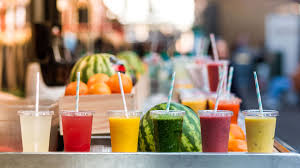
23-May-2024 , Updated on 5/23/2024 6:45:13 AM
Juice Good or Bad? What to know?
Consumption of fruits and vegetables is very important in the diet in order to make your body healthy and happy. Consuming juice after having extracted juice from the fresh fruits and fresh vegetables has gained popularity as a method of increasing the nutrient intake. Whereas many people believe that it helps to improve one’s health, others simply believe that it robs the food of essential nutrients. In this article we will see various benefits as well as the drawbacks of drinking juice to know whether it can help or not.
Juice, in its general sense is the natural liquid that is derived from fruits and or vegetables with most of the structural parts say seeds and pulps removed.
Why do People drink juice?
People drink juice for various reasons:
- Detoxification: Some people even go for juice-only diets because, per their thinking, it aids in eliminating all the solid food and the toxins from their bodies for number of days or weeks. But this does not seem to be true because a number of scientific researches do not confirm these reasons.
- Nutritional Supplementation: The culture of taking juices makes it easy for people to take vitamins and minerals from the fruits and vegetables for those who do not take the products daily.
Health Benefits of Consuming Juice
Intake of juice can go a long way in increasing nutrient consumption. Most people are unable to consume adequate nutrients in through food alone and thus drinking juice is of a lot of help.
Several studies have shown that fresh juices or blended concentrates had beneficial effects on enhancing folate as well as antioxidants such as beta carotene, vitamins C and E.
Disease Prevention and Juice
A number of studies are available for shedding light on disease risk factors of whole fruits and vegetables, but the existing data on fruit and vegetable juices is limited. However, there are certain findings of potential benefits as pointed out in the later section. For instance, apple and pomegranate juices contain properties that can lower the rate of blood pressure and cholesterol; therefore, promoting better heart health.
Further, a regular intake of fruit and vegetable juices has been found to decrease the risk of the Alzheimer’s disease probably because of the rich content of polyphenols a type of antioxidants that protects the brain cells.
Whole Fruit vs. Juice
People who support the intake of juice suggest that it is healthier than having the whole fruits or vegetables since it will help the absorption of the vitamins and minerals. Still, there is no evidence to support the effectivity of this remedy in various scientific studies.
Actually, the fiber component found in whole fruits and vegetables is one of the most important responsible for the health promotion capacity. Juice consumption eliminates fiber since the flesh of fruits and vegetables is mostly fructose which can be unhealthy because in its natural state, fiber slows down the absorption of sugar, aids in digestion and boosts fullness. For instance, more health benefits can be gained through whole apples in relation to cholesterol levels than in apples juices because of the fiber content incorporated in whole apples.
The use of juices in weight loss.
Juice diets are adopted mainly for purposes of weight loss, and this could be attributed to the fact that they usually involve the consumption of very little food or none at all, and therefore very few calories are consumed. However, such diets are not very easy to follow and can eventually harm metabolism in a person. Besides, juice diets are incredibly limited in the daily nutrient intake with no proteins or healthy fats, resulting in possible nutrient deficiencies.
Juices as Meal Replacements
Juice fasting is an improper way of eating because it implies replacement of meals with juices. Juice has no protein and fat; two important nutrients that are essential in the building of muscles, provision of energy, balancing of hormones and cell health. But if you do decide to swap one meal for juice ensure that the other meals you are consuming are balanced.
Juice Cleansing? Is it True?
Juice detoxification is also not true and has no scientific backing to say that the body can purify itself through juices. Your liver and kidneys purify your body of toxins for which you don’t even have to be on a liquid diet. In addition to this, taking large amounts of juices is deemed unhealthy since it causes numerous problems like; increases the chances of developing metabolic syndrome, obesity, kidney, and liver illnesses, is detrimental to the the whole body.
Juice and Its High Sugar Content
Fruit juices contain natural sugars, that is why they have much sugar. On average it is found that one serving of juice is equivalent to eight ounces and it has around 30 grams of sugar hence similar to the sugar in soda. And can cause numerous diseases such as, heart disease, stroke, type 2 diabetes, and some types of cancer. Instead of consuming too much sugar, eat whole fruit whenever possible.
Conclusion
Fresh juices give necessary vitamins and antioxidants; however, they do not contain fiber, and some other useful qualities that can be found in raw fruits and vegetables. Juice sometimes is useful to boost the amounts of certain nutrients but should not compensate the whole fruits and vegetables consumption. It is, therefore, suitable to take juice occasionally and as a supplement to other meals to ensure one’s body does not develop complications from taking excessive sugar or lack of other essential nutrients.

Student
An MBA in finance imparts and improves management aptitude, inventive ability, critical thinking ability, and so forth. It offers a real-time experience that fabricates a staunch career foundation for students and working professionals. It helps them to thoroughly understand the financial sector.
Join Our Newsletter
Subscribe to our newsletter to receive emails about new views posts, releases and updates.
Copyright 2010 - 2026 MindStick Software Pvt. Ltd. All Rights Reserved Privacy Policy | Terms & Conditions | Cookie Policy